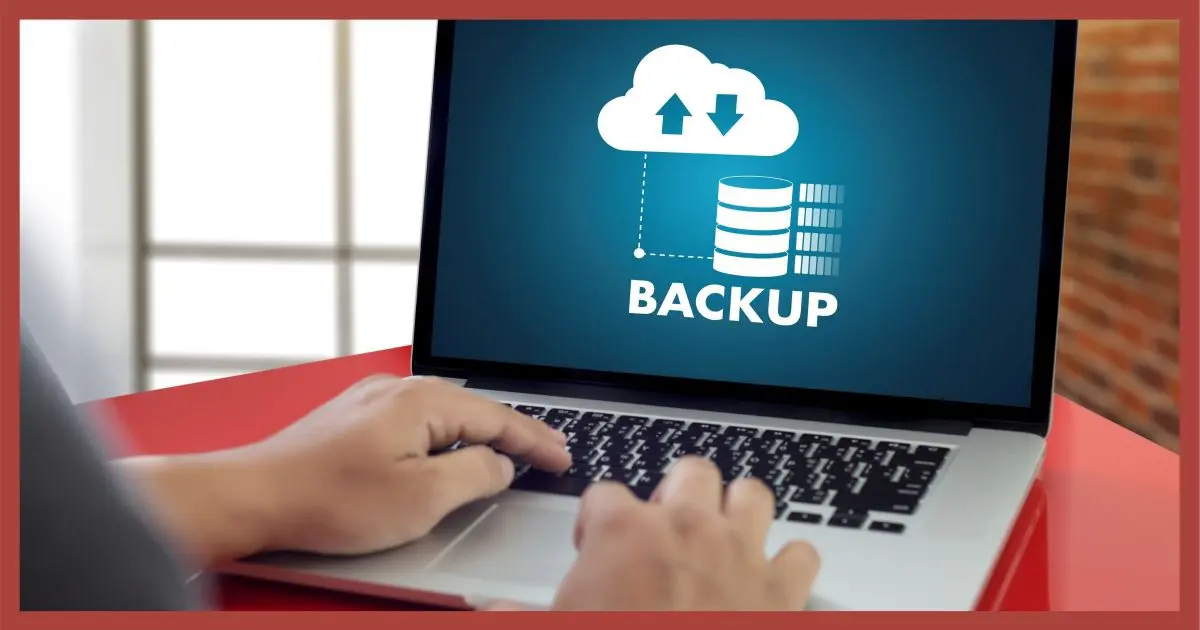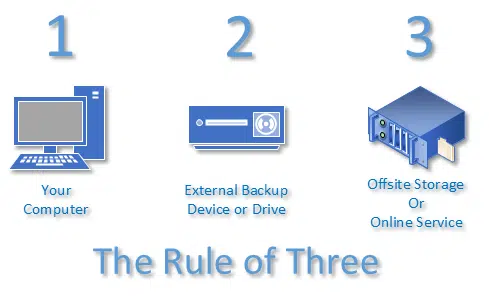Only, perhaps, the most important term in all of computing.

Backup is one of those terms we all take for granted — yet it’s not uncommon to find different people who have different ideas of exactly what it means.
It’s so important and so basic to safely protecting your information and your work that it’s worth a little dedicated attention.
Honestly, I’m surprised it’s taken me this long. 

Just What Is a Backup?
A backup of something is a copy placed somewhere else. The further that “somewhere else” is from the original, the better protected both are. More copies, in more locations, protects even more.
A backup is a copy
The fundamental concept of a backup is very simple: it’s nothing more than a copy.
A backup is just a copy: of a file, of your data, of a computer, of an operating system, of anything or everything.
Remember this phrase:
If it’s only in one place, it’s not backed up.
By that I mean if you have only one copy of something — call it the original — and something happens to it, it’s gone forever. If a hardware failure, malware, account hack, or similar scenario takes away that one and only original copy, it’s gone.
Forever.
That’s why I harp so much on backing up.
And backing up is nothing more than making a copy of something.
A backup is a copy somewhere else
Now, for bonus points, let’s talk about the copy’s location.
When we back up, we make a copy somewhere else.
“Somewhere else” is open to interpretation, depending on what you’re doing, but the important thing is that if you make a copy of something, you’re backed up, and the farther that copy is from the original, the better protected it is.
For example, if you’re working on a Word document, you might:
- Click on Save.
- Click on Save As and save the file with another name.
- Copy the document in Windows File Explorer.
Those kinds of actions protect against certain types of failures. Saving periodically as you work protects you from the application crashing by writing your work so far to disk. Save As, or using Windows File Explorer to copy the file, will protect you from changes you later regret by saving a copy of your work before those changes.
They’re not necessarily going to protect you from things like hard disk failure or malware. Moving your backup farther away from the original protects you from more and more things.
- Storing it on an external drive might protect you from a variety of hardware and software failures on your computer.
- Storing it on an external drive you then disconnect and keep in your desk drawer would protect you from all that plus overly aggressive malware.
- Storing it online, or on a disk in a bank vault, would protect you from all that and more, including your house burning to the ground.
Each is conceptually (and often physically) a little “farther away” from the previous location.
When in doubt, more is better
There’s no such thing as too many backups, in my opinion. However, there’s definitely such a thing as too few.
A great place to start is the “rule of three” or “3-2-1 rule”:
- Three copies
- On (at least) two different media types
- With one stored elsewhere

This protects you from multiple types of failures in multiple places.
It’s a great rule with which to start.
Back up
And finally, one little clarification:
Is it backup or back up?
This is something that my editor catches me doing incorrectly frequently.
Backup is a noun or an adjective. A backup is a thing. I have a backup or a backup copy or a backup of my hard disk.
Back up is a verb. To back up is an action. I make a backup (thing) by backing up (action).
So a backup is the thing you’re trying to create, and backing up is what I’m trying to encourage you to do!
Do this
Subscribe to Confident Computing! Less frustration and more confidence, solutions, answers, and tips in your inbox every week.
I'll see you there!
Podcast audio
Footnotes & References
1: Technically, it hasn’t. This article is based on a chapter from a book I published some years ago.




“Three copies on (at least) two different media types with one stored elsewhere”
that’s good basic advice. but I figure even for the lazy types, here is a absolute minimum (which is not much less than your standards)… two copies of data on two different hard drives (or equivalent). so Data A on HDD1 and Data A on HDD2 (this is the best all around choice and is simple to do with minimum effort). those who fail to keep up with that bare minimum standard (or equivalent) are just asking for trouble as it will give one a reasonable level of protection against data loss from hardware failure even though one might be at risk from data loss from potential computer viruses and the like but one can work around that a bit by having one of the two hard drives for data backup only connected occasionally (like external hard drive and the like) to transfer data to it and then disconnect it.
but to go a bit further… the two HDD’s are a nice bare minimum but for higher priority data, in addition to the two HDD’s, I like quality DVD media (Verbatim is probably the best bang-for-the-buck basic DVD media (although I do have some Taiyo Yuden 8x DVD-R (TYG02 media code) to which are solid)) since those will likely last at least 10-20+ years (for a conservative figure) as I got DVD media over 10 years and it’s still going strong. NOTE: only real negative with DVD media (and the like) is it’s a bit slow to access lots of it and even assuming the media itself lasts a fairly long time, I figure finding drives that can read that data might become a issue down the road but should be okay for the foreseeable future. say at least another 10, maybe 20 years, but beyond that, who knows. because I don’t think finding DVD drives a computer can use to read the DVD discs one makes will be a issue for at least another 10 years, but once you start getting around 20 years or so from now, it’s possible they might become more scarce and beyond that is hard to predict. still, even if we assume 10-20 years, DVD media is still a viable option for that ‘can’t afford to lose’ kind of data like family photos and videos and the like. but for general data backup, hard drives are the best all-around.
with that much said… I am sure one can go a bit further like storing data in different locations which would be solid protection in case of a house fire for example. or… online storage can help protect against it but I never would rely on online storage of important data as you just never know if you can count on retrieving it when needed but it’s still a nice option in the case on the off chance your local data backups get damaged.
NOTE: I would avoid flash storage for anything important as it’s only good for temporary storage.
I think what I said above pretty much sums up important data backup.
You can still buy USB floppy disk drives at least 20 years after they’ve become obsolete. It would expect external DVD players to be around much longer as there are many more people who use DVDs than even know what a floppy drive is. They’ll probably be around 50 years from now unless all of the optical media has deteriorated by then. The key is to periodically copy that data to more viable media as time goes on.
@ Mark Jacobs (Team Leo)
I hope your right. but I think it’s hard to accurately predict anything 50 years from now which is why I went with my 10-20+ years estimate for a conservative figure (since I don’t think it’s a stretch for quality DVD media to last at least that long from the looks of things. NOTE: but I got some burned DVD’s around 10 years old or older already, so if they last 20 years or so, I might only have another decade or so of use out of them). but unless something drastic changes, putting standard hard drives aside, optical media is probably the best alternative for at least semi-long term storage of high importance data especially for those who don’t want to rely on online backup and want something locally stored. I hope the SATA standard hangs around for the foreseeable future to which will help so things don’t change too much.
but even assuming your right about DVD drives/media still being around in about 50 years from now… at that point I think it’s plausible the DVD media itself will be deteriorated by then(?) (I won’t be surprised if quality DVD media lasts at least 20+ years, but beyond this who knows). but at the same time, unless someone is really young (say somewhere around 20 years old), there is a reasonable chance they might be dead in 50 years, so they might not really care. hell, even if I am alive in 50 years ill surely be close to the grave and probably won’t care much at that point 😉 ; so I am mostly just hoping DVD media lasts at least another 20-30 years or so as within the next 20-30 years I suspect is when ill care most about this stuff as much beyond that, there is a reasonable chance ill be dead or close to it (assuming I die somewhere around the average age of death which I heard is pretty much 80 years old or so) and won’t no longer care.
You can save them to a hard drive or flash drive keep at least one, better two, backup copies with one in a different location. Check them for usability every so often and copy them to the next generation of storage media whenever on comes out. Disk drives haven’t changed much in 40 years but the interface has changed a few times so that’s something to look out for.
An easy way to get that third off site backup is to use OneDrive for all of your personal files. If you have Microsoft (Office) 365, to get 1 TB of storage. If you don’t want to pay, you can distribute your personal files between the free versions of OneDrive, Dropbox, and Google Drive which would have enough storage for most people or at least their most important files.